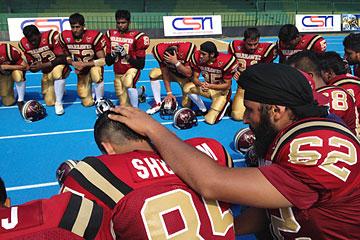
The Bangalore Warhawks' pregame prayer.
(2 of 2)
The U.S. broadcasting model views live sports as programming, but the EFLI turns that notion on its head. The entire season of 23 games, plus playoffs and championship, was played during August in an empty stadium in Colombo, Sri Lanka. The EFLI taped all the games and then created programming out of them. EFLI broadcasts resemble U.S. pro games in a hurry, edited so there are no huddles, no time-outs and no waiting around. "Live is an old-fashioned model," says Whelan. "We didn't give a damn about selling tickets. What? Are we going to sell 20,000 tickets?"
TEN Sports was already experimenting with new sports and saw the EFLI as a low-cost, low-risk investment, says CEO Atul Pande. In exchange for an initial 75% share of the advertising revenue — in EFLI broadcasts, unlike NFL ones, commercials appear as a crawl or to the side during play — the network agreed to a five-year deal to air the games to 14 countries in the region and reach some 170 million homes. The league expects to generate profits after the first two years.
It's an unproven strategy. Because fans did not have a chance to watch the games live, it's hard to build local support for the home team. The EFLI is betting that's not the only way to create a football hero. Its answer to Tim Tebow is a 20-year-old native of Bangalore named Roshan Lobo. Before joining the Bangalore Warhawks as a backup running back this year, Lobo had never seen an NFL game. Everything he knew about the sport, he learned from Hollywood movies like The Waterboy and YouTube clips of the NFL. "When you have the ball, you just need to run away from people," Lobo says. When the EFLI's first games aired in September, Lobo was the starter — in no small part because two other running backs quit after they got full-time government jobs.
What the players lack in experience, the EFLI makes up for in production value. The league brought in its own camera crews, announcers and producers, so the televised broadcasts, unlike the actual play, have the slick professionalism of Monday Night Football. The league has also packaged preview clips, including interviews with Lobo and other players, as well as coaches, who talk about Lobo as if he is the next Lionel Messi. "Lobo is like Bo Jackson. Lobo knows football," says a coach. A commentator gushes, "The coaches told me this guy's going to be a star, and he has become a huge star."
There is another way to create a hero: develop a real Indian Messi or Yao Ming from the ground up. That's what the global sports consultancy IMG is trying to do with basketball in India. In 2010, IMG partnered with the Indian conglomerate Reliance Industries in a 30-year deal with the basketball federation and a 15-year deal with soccer's governing body to invest more than $200 million in sports infrastructure. In return, IMG owns the commercial rights to the domestic soccer league, including the TV licensing rights, and the right to sell basketball in India.
Developing enough players to fill out a professional-quality league will require a vast increase in participation. Basketball has one advantage: it's played widely in Indian schools, so IMG is giving hoops a boost, offering scholarships to promising players to live and train in the U.S. In a country of 1.3 billion, IMG needs to find only one Yao. "A single athlete can single-handedly create an entire industry that didn't exist before," says Bobby Sharma, head of worldwide basketball development at IMG. "That's not lost on us."
Lobo is hedging his bets. He will train for next season but has a backup plan. "I'm searching for a job because I'm not sure about football getting famous in India," he says. Lobo may not be much of a football player yet, but he is already a star. Soon after the Bangalore Warhawks' EFLI debut, he signed his first autograph.
